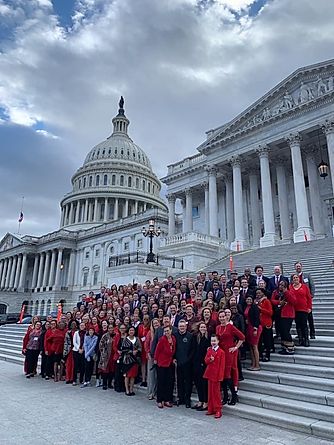
23 Oct Storming the Hill
Steve and I just returned from 3 days in Washington DC with the American Heart Association/American Stroke Association. About every two years they “storm the hill”, bringing advocates with a passion for heart health to meet with house and senate members who can help drive legislation on priorities for the AHA/ASA. About 150 volunteers from around the country joined AHA staff for education on Wednesday, Capitol Hill meetings on Thursday, and debriefing/planning on Friday.
It was truly inspiring to see the passion of so many people who have been deeply affected by various forms of heart disease, including stroke, and how they have turned their difficult situations into an opportunity to help others – most notably, future generations.
-
A woman from Boise who suffered a massive aneurysm due to a congenital heart defect and is alive today only because of cutting edge work at the NIH;
-
A college student from Southern California who suffered a severe stroke when she was 10, had 3 brain operations and has done countless hours of therapy, and now is “differently abled” but fully independent, pursuing her BA and MA at an East Bay college;
-
A 70 year-old woman from the Bay area who is a cancer survivor herself, but also an activist against flavored tobacco products because she sees the risks to her grand kids, especially high in communities of color. She has already driven important change in local communities on this issue, and wants to do so nationally as well.
We helped pitch legislation to address the three issues that were the focus of this year’s trip:
-
Balanced/surprise billing: This one hit us personally, so we had stories to tell. To be fair, it’s an issue of the relatively fortunate – people who have health insurance. But how many of you have gone to the doctor, or been forced to take an ambulance, only to get bills months later from providers “out of network” that you had no role in selecting?! We heard stories of people who have been forced into personal bankruptcy because the doctor groups, hospitals and insurance companies have all the power, and the patients have none. There are many bills being drafted to address this, and AHA is fighting to be sure the patients get protected.
-
NIH Funding: The National Institute of Health is a critical source of health research funding and activity. It’s budget was decimated about 10 years ago, and while it’s been growing lately, it still hasn’t caught up. And the data shows such funding is one of the best investments the government (taxpayers) can make, with research cost being outpaced by many multiples in healthcare cost savings in the future. Further, Cardio Vascular Disease (CVD) is the leading cause of death, and gets only about 3% of NIH funding. Stroke is the 5th leading cause of death, and leading cause of disability, and gets only 1%. AHA is advocating for an increase in NIH funding of $2.5 billion or more (looking good right now) and more focus on CVD and Stroke research.
-
Tobacco Flavoring: The recent news about death and severe illness from vaping is just the tip of the iceberg. Flavored tobacco – most notably in vaping but also in cigars and cigarettes, are being marketed directly to kids who like the taste and don’t appreciate the dangers of a nicotine addiction. Use is not only rampant in high schools, but in middle schools! AHA is pushing for a complete ban on flavored tobacco products – vaping and otherwise. The data shows they are NOT primarily being used to help people quit, they are seducing our youth to become the next generation of nicotine addicted adults.
It was a busy day on Thursday, with five congressional meetings. We joined a group of about 10 Californians for meetings with healthcare staff from both Senator Kamal Harris’ and Dianne Feinstein’s offices. Steve and I then met with just one or two AHA staff with staffers working for Rep. Mark DeSaulnier (CA-11, East Bay), Anna Eshoo (CA-18, peninsula – US!), and Jimmy Gomez (CA-34, central LA). Pleased to say that our CA representatives are, to a person, very supportive of the AHA positions, and some are sponsoring bills that address them.
The trip was inspiring. We learned a lot. Hopefully we made a small difference. And it definitely helped us think more deeply about the kind of policy change efforts we might want to drive through Stroke Forward, as we expand the activities of our nonprofit in the months ahead.
Thanks for following our travels and activities, and stay tuned for more.

No Comments